
Free Tips and Tricks on Lead Scoring
When I’m asked what Marketo does, one of the first descriptions that comes up is that Marketo is a lead generating machine. The best way it does that is through lead scoring. I’ve used a few lead scoring systems in the last few years. Marketo’s lead scoring system is great, because it is so flexible and customizable. I’m sure you’ve heard of the conflict between Sales and Marketing. Sales complains that Marketing isn’t passing along good leads. Marketing complains that Sales isn’t following up with the leads. A well thought up and regularly updated Marketing lead scoring system is the effective solution aligning Sales and Marketing.
In this post, I’ll discuss the following:
- Foundations of Marketo Lead Scoring
- Establishing the Right Scoring Criteria
- Using Marketing Sales Insight to Check Scoring History
- Auditing and Updating the Scoring Campaigns
Foundations of Marketo Lead Scoring
The Marketo lead scoring program can be divided into several scoring categories: Behavior Scoring, Demographic Scoring, Negative Scoring.
Behavior Scoring is implicit, which means that it’s based off of the person’s interactions with your marketing resources or your website. Demographic Scoring is explicit, which means that it’s based off of other observable information such as Job Title/ Role, Company Size, and Industry. Negative Scoring is also implicit, but it’s based off of what the person doesn’t do and reduces their score based off of inactivity.
To set up your scoring campaigns, first create your Scoring Program, then create folders for Behavior Scoring, Demographic Scoring, and Negative Scoring.
Behavior Scoring
It’s good to include a variety of campaigns for this scoring category. Have a few around the website including a filling out demonstration form, contact us form, or a gated content form. Other popular website-related campaigns center around web pages visited or search terms used. Include a few campaigns around emails including opens or clicks. Also include a few campaigns around registering or attending trade shows or events.
Ex. Website – Filled Out Gated Content Form
- Add a new Smart Campaign
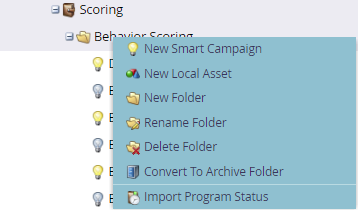
2. Name the new Smart Campaign
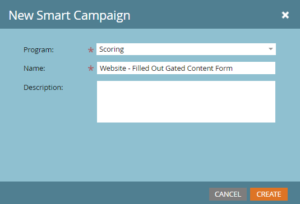
3. Set the Smart List rules

4. Set the Flow automation. You want to set the Person Score and the Behavior/Demographic Score separately so that both are changed.
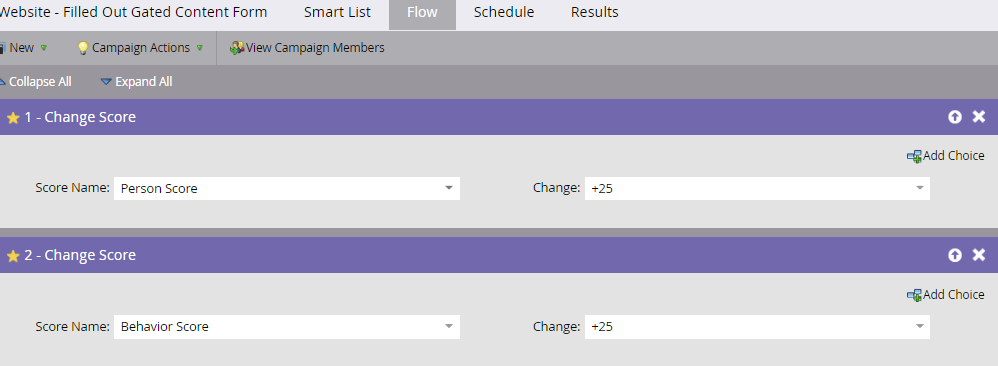
5. Activate the lead scoring campaign
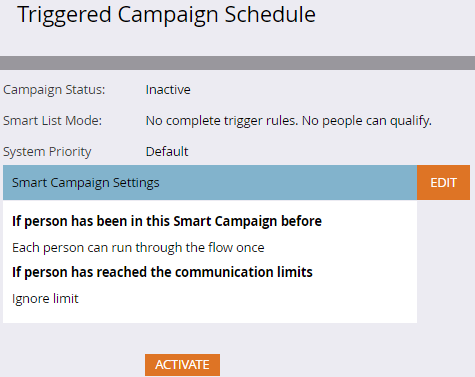
Demographic Scoring
Having a variety of demographic scoring campaigns is also very important. What are the characteristics of your company’s ideal lead? Include a few campaigns around Job titles, Annual Revenue, employee size, or location.
Ex. Job Title
1. Set the Smart List rules
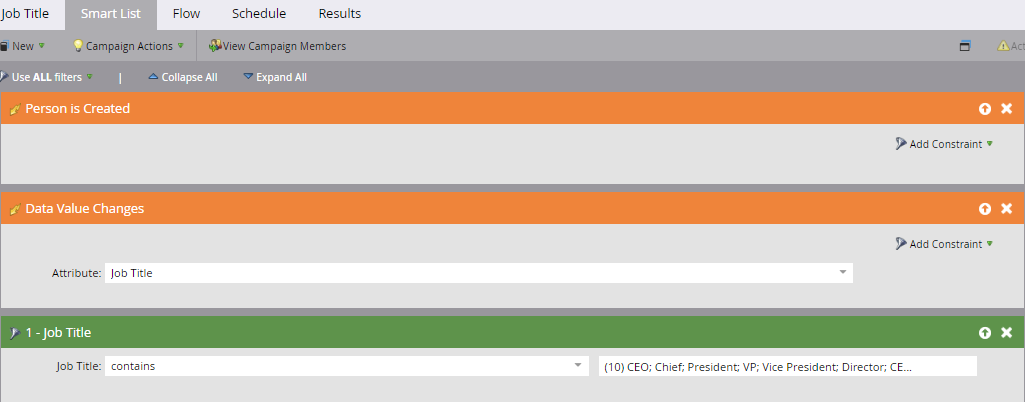
2. Set the Flow automation. You want to set the Person Score and the Behavior/Demographic Score separately so that both are changed.
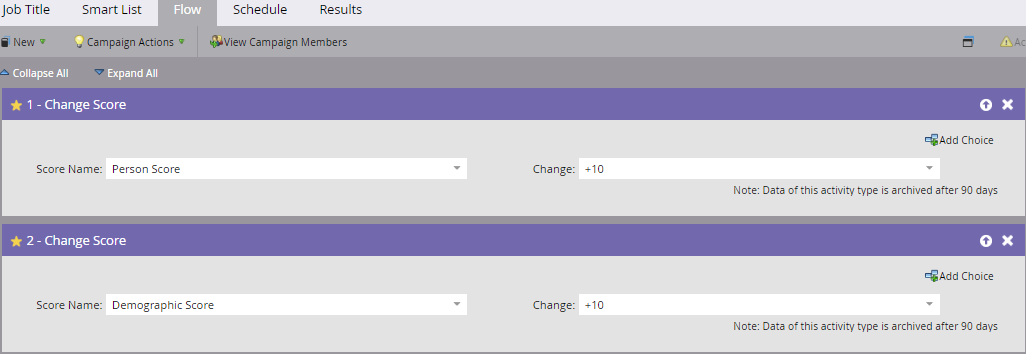
Negative Scoring
Negative scoring is a great way to make sure that your Sales team continues to get currently interested leads. You can run them against demographic characteristics such as for non-preferred Job Titles or Companies or run them against behavior characteristics such as inactivity.
Ex. Score Decay – Inactivity
1. Set the Smart List rules. This is to negatively score leads for inactivity, but of course they need have been given the opportunity to have acted. In this example, they need to have been sent an email.
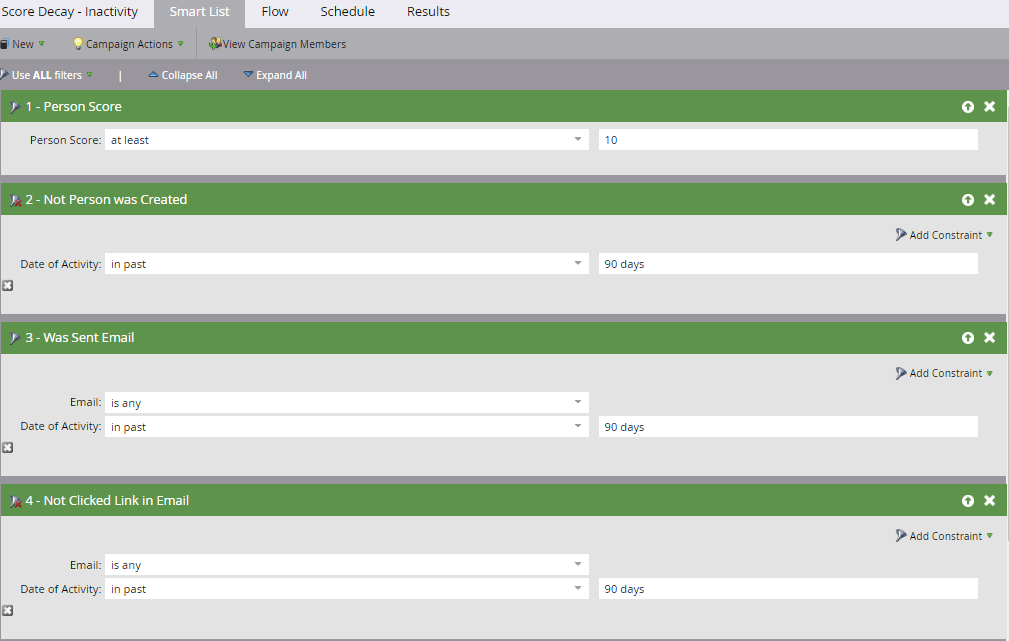
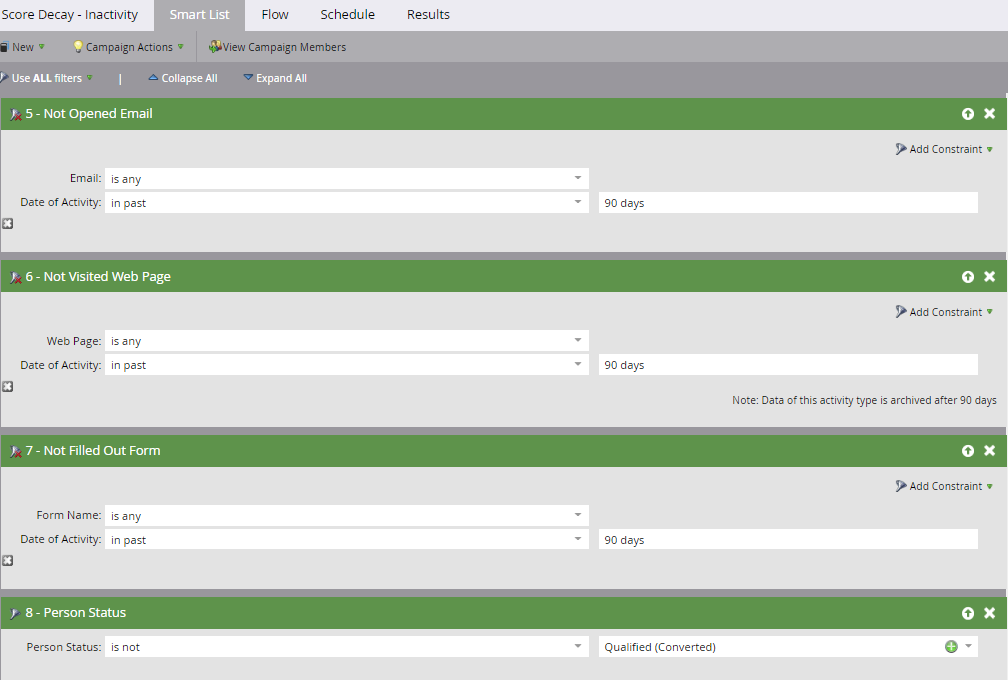
2. Set the Flow automation. You want to set the Person Score and the Behavior/Demographic Score separately so that both are changed.

Establishing the right scoring criteria
Once you have a list of scoring campaigns, it’s time to begin a joint meeting your Sales team. Run your list by them to confirm that these are also what they would find in a good lead. Now it’s import to decide the priority of each scoring campaign.
What is your scoring threshold/ what score does a lead need to reach to become qualified? Depending on what both parties decide, this threshold may be 25, 50 or even 100.
How many points does each campaign add or subtract from a lead?
Using Marketing Sales Insight to check Scoring History
Marketo Sales Insight is a Marketo created Salesforce app, where your Sales team can check the new scoring process. They can go into the Scoring History tab of each person to see just how they got their current score. This is a great way for Sales to monitor the new scoring campaigns after the initial launch and give detailed feedback.
Auditing and updating the Scoring Campaigns
Initially setting up scoring is difficult, and may take a few months and several changes before both Sales and Marketing are happy with the scoring campaigns.
However, Marketo lead scoring doesn’t stop there. It’s best practice to audit scoring campaigns every quarter to make sure that scoring campaigns are still relevant. Perhaps your companies have added more videos or would like to focus more on gated content. Maybe you’ve just discovered that leads from the the west are more profitable. Scoring campaign auditing is a great way for Marketing and Sales to dialogue and stay in agreement about quality leads. After all, you are both here to increase company value.
Learn more about the Marketo Lead Scoring
Marketo lead scoring is one of Marketo’s best features. If you’d like to learn more, check out the following resources:
Marketo has a fantastic resource, full of examples of lead scoring tactics, in their article The Definitive Guide to Lead Scoring.
Josh Hill, the author of the Marketing Rockstar Guides, wrote a great post called How to Build a Lead Scoring System in Marketo. It includes additional links to a pdf and to Slideshare.
Perkuto, a marketing automation consulting agency, wrote a resourceful post titled Best Practices for Setting up Lead Scoring in Marketo.
Also, see Digital Marketing Techie’s other Marketo resources:
The Complete Guide to Marketo Salesforce Campaign Syncing and Reporting
Aligning Marketing and Sales Using Salesforce Lead Lifecycle Reporting
Cracking the Code on Salesforce Campaign and Multiple Campaign Influence Reporting

